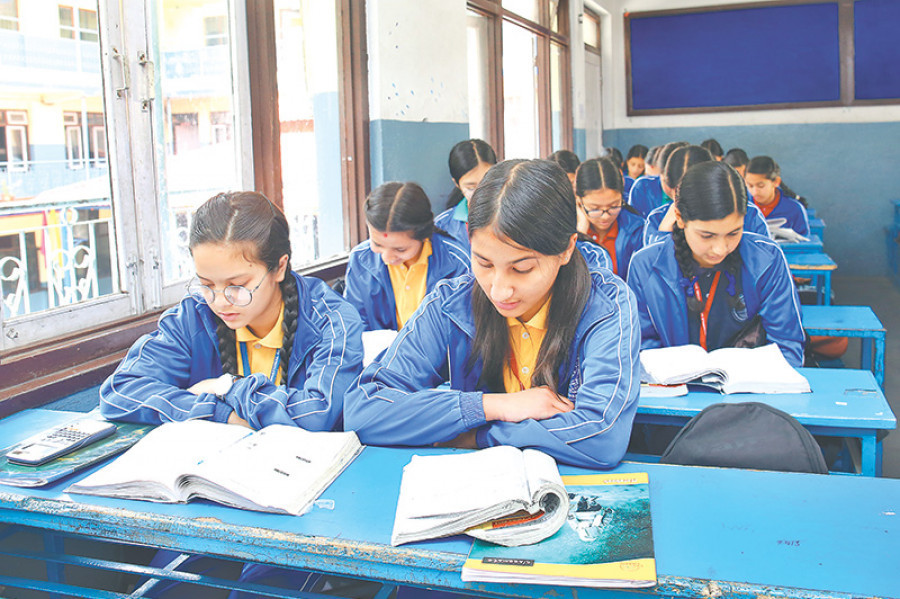National
Bagmati Province proposes converting private schools into trusts and cooperatives
The provision, says a provincial minister, will provide free and compulsory education as envisioned by the constitution.
Binod Ghimire
The Social Development Ministry of Bagmati Province has come up with a proposal to convert private schools into trusts or cooperatives in the spirit of the Constitution of Nepal and as suggested by the High-Level National Education Commission.
The proposal, which will come to effect after endorsement by the provincial Cabinet, will provide the basis for the provincial government to formulate a law to govern the education system within the province.
“Private schools will be converted into trusts and cooperatives,” reads one of the clauses of the draft policy. “The local governments will be supported to ensure there is only public education at the school level.”
Yubraj Dulal, Minister for Social Development of Bagmati province, said the draft policy would be presented before the Cabinet in a few weeks. He said that the policy related to the conversion of the private schools would remain intact when presented before the Cabinet, although some other provisions could be revised .
“The provision was included as per the spirit of the Constitution of Nepal. The country can never move towards the path of socialism with private schools intact,” he told the Post.
The preamble of the constitution says Nepal is a socialism-oriented state. He said the policy is based on Article 31(2) of the constitution, which makes the state responsible to ensure compulsory basic education and free secondary education for all.
The government in August 2018 formed the High-level National Education Commission headed by Education Minister Giriraj Mani Pokharel which on January 15, 2019 submitted its report to Prime Minister KP Sharma Oli recommending to convert the private schools into trusts from companies within 10 years.
It said the conversion process would start in three years. However, the education policy endorsed by the Education Ministry in November last year didn’t have any provisions on ending private ownership of schools.
Commenting on the ministry’s change of policy, members of the commission said the government was working at the behest of private schools by not rolling out any laws to control the privatisation of education.
Despite the federal government’s reluctance to implement the recommendations of the minister-led commission, which has not been made public, the Bagmati provincial government claiming its independent status maintains it can implement any policy in line with the constitution.
“Allowing private schools to operate in the present form would be against the spirit of the constitution which envisions for the free and compulsory education at the school level.” Dulal told the Post.
According to Ritu Raj Sapkota, the chairperson of National Private and Boarding Schools’ Association, Nepal, private schools across the country have invested Rs 600 billion in the business and 23 percent of schoolgoers attend private schools.
The provincial government believes implementing its policy will not be a problem in all its districts, barring the three districts in the Kathmandu Valley and in Chitwan. “The private schools will be supported to shift their priority towards higher education,” said Dulal.
Of the 35,520 schools across the nation, 6,687 are private, according to the government’s economic survey for fiscal year 2019-20. There are 7,031 schools in total in Bagmati Province. The breakdown of private and public schools in Bagmati Province was not available. Of the total 7.021 million school students across the country 1.4 million are from Bagmati, according to the economic survey.
Compensation for the private school operators however would only be “nominal”, according to Dulal.
“Everyone has to abide by the law the state adopts,” he said when asked how possible it is to convert private schools into trusts. “There will be incentives for them.”
Meanwhile, provincial lawmakers have also backed Bagmati government’s policy.
“It is a long-term plan that will be implemented gradually. How long the conversion process takes will depend on how much money the government can allocate for it,” Ranta Dhakal, a member of the provincial assembly and former chairperson of All Nepal National Independent Students' Union-Revolutionary, told the Post.
Private school operators, on the other hand, are not happy with the plan.
“The government should focus on improving the quality of education in public schools rather than hounding private schools,” Sapkota said.




 9.51°C Kathmandu
9.51°C Kathmandu














